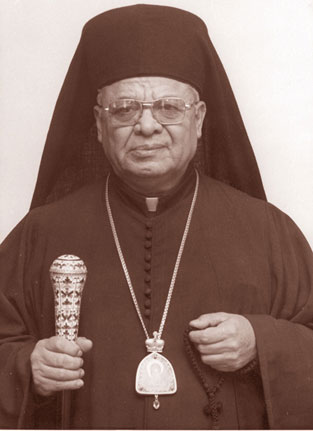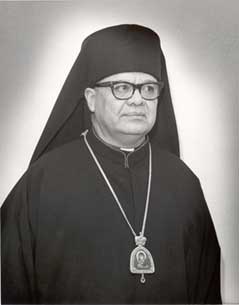25th anniversary of the repose of Bishop José [Cortes y Olmos]
 January 28, 2008, marks the 25th anniversary of the repose of His Grace, Bishop José [Cortes y Olmos], of Mexico City, the first Bishop of the Mexican Exarchate of the Orthodox Church in America.
January 28, 2008, marks the 25th anniversary of the repose of His Grace, Bishop José [Cortes y Olmos], of Mexico City, the first Bishop of the Mexican Exarchate of the Orthodox Church in America.
Bishop José was born on August 5, 1923, in Santa Teresa, Guana Juato, Mexico. His parents were devout Roman Catholics. José began his primary education at the age of eight in the Santa Teresa Rural Federal School. Upon completing his middle and seminary education in Jesuit schools, he was sent to Barcelona, Spain, and Rome, Italy for further theological study. He received a Doctorate in Canon Law.
José then went to Havana, Cuba, where he taught at the Jesuit College of Belen and served as a leader of “Catholic Youth Action” while serving local Roman Catholic parishes. Dissatisfaction with the Church of Rome led to his break with it in 1950, at which time he joined the Mexican National Church. In 1961, he was elected to be its bishop.
The origins of the Mexican National Church as a church, distinct from the Roman Catholic church of Mexico, are connected with events of the Mexican Revolution. During the Revolution antagonisms against the Roman Catholic Church were aroused by its historic association with the Spanish colonialists. Some of the first laws of the new Mexican Republic were antireligious. In 1917, all church properties were nationalized, many churches were closed, monasteries were abolished and the communities dispersed, and clergymen were required to obtain licenses to function. Several attempts were made to establish a “national church.” In 1926 a Roman Catholic priest, with government support, was made head of the Independent Old Catholic Church of North America, and the Mexican National Catholic Church was founded.
The church thrived under the patronage of the government and at once extended its jurisdiction to Mexican communities in Texas. The National Church continued as an Old Catholic community until Father José Cortes y Olmos was appointed its bishop in 1961. The new bishop and his clergy became gradually convinced, through study and reflection, that the Old Catholic ecclesiological principles did not conform to the criteria of the One, True, Catholic Church. They came to identify with Orthodox Holy Tradition, and adopted the designation “Orthodox” - Iglesia Ortodoxa Catolica en Mexicao (Orthodox Church in Mexico).
In 1965, Bishop José and his clergy contacted the then rector of St. Seraphim’s Church in Dallas, Texas, Father Dmitri Royster (now Archbishop Dmitri of Dallas). Archbishop Dmitri had been instrumental in converting many Mexicans to Orthodoxy and was translating Orthodox liturgical services into Spanish. Archbishop Dmitri presented the case of the Orthodox Church in Mexico to the hierarchy of the OCA. After a number of exchanges and visits, the Holy Synod sent Archbishop Dmitri to visit Mexico officially and to report on his findings. This report was studied by the OCA’s Department of Canonical Affairs, which recommended acceptance of the Mexican communities into the Orthodox Church.
 In 1971, Bishop José petitioned for the acceptance of the Church into the Orthodox Church in America. He and other priests of his community were received in their Roman Catholic rank of priest. Father José studied at St. Vladimir’s Seminary prior to his consecration as Bishop of Mexico City. He was consecrated at the Holy Virgin Protection Cathedral in New York City on April 22, 1972.
In 1971, Bishop José petitioned for the acceptance of the Church into the Orthodox Church in America. He and other priests of his community were received in their Roman Catholic rank of priest. Father José studied at St. Vladimir’s Seminary prior to his consecration as Bishop of Mexico City. He was consecrated at the Holy Virgin Protection Cathedral in New York City on April 22, 1972.
On January 28, 1983, Bishop José fell asleep in the Lord after a relatively short bout with cancer. His Beatitude, Metropolitan Ireney, presided at the funeral service in Mexico City on February 1, 1983.
It was not until 2005 that a successor to Bishop José was found. On May 28 of that year Archimandrite Alejo (Pacheco-Vera) was consecrated Bishop of Mexico City at St. Tikhon’s Orthodox Monastery in South Canaan, Pennsylvania. The Mexican Exarchate currently contains nine churches and missions, including the Cathedral of the Ascension in Mexico City.
May Bishop José‘s memory be eternal!
